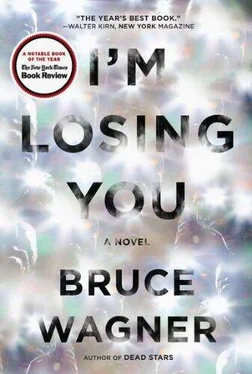Her first concern was fixing the Bonneville because, in its current shape, Ursula didn’t think it would make it to Chanhassen. The alignment was bad. She should hurry, though — an ECKist friend had been to a gathering in upstate New York and the Mahanta appeared ill; as a vessel for so much energy, his physical body was often under siege. The friend didn’t know where the Mahanta lived but was sure it couldn’t be far from the Temple.
“Mama, look! Its eyes!” A boy stood over Samson, who was now awake. “What’s wrong with its eyes?”
The mother grabbed him roughly by the wrist. She smiled at Ursula. “I’m sorry.”
“It’s all right.”
“He’s darling ,” said the mother, peering into the carriage.
“But why are his eyes like that?”
“That is rude!” the mother exclaimed, mildly appalled. Ursula reassured the woman, then told the boy the baby was blind.
“But how did he get blind?”
“Well,” said Ursula patiently, “it’s just the way he was born.”
“What’s his name?” she asked.
“Samson.”
“He is a doll . He’ll have no trouble finding his Delilah.”
“He already has ,” Ursula said with a twinkle. “Me.”
The little boy asked his mother who Delilah was over and over until they were out of sight.

She was pushing Samson toward the Imaginarium when the two women collided. Ursula gasped, though wasn’t sure why. “Do I know you?”
Rachel’s eyes bugged, jaw trembling. “We — we met at — at the mortuary…”
Ursula fought for air. She sneezed three times, then burst into tears.
“Please, please don’t!” groaned Rachel, weeping herself.
“My Tiffany! My baby!”—dumbly backing the carriage away.
“Please! I’ve been dreaming about her…”
“You! — ” Then Ursula remembered this was the woman who had washed her girl; the last to see her translate from this earth. “Was she — was she beautiful?”
“Please!—”
“ Tell me! Was she beautiful?”
“Oh yes! So beautiful! The most beautiful thing I have ever seen —”
“And you…took care of her?”
“Yes! We took perfect care of her.” Ursula slowly deflated. “Are you…are you well? Can I—”
“Thank you!” shouted Ursula, abruptly heading for the long ramp beside Gelson’s.
The part-time washer of the dead gave chase and shoved something into her hand. “Take it! It’s yours!” Now it was Rachel’s turn to flee.
She stormed off, stymied and haunted — like a witch whose potions had all failed.
Perry Needham Howe
Jeremy Stein made good on his promise to take Perry to lunch at Ginza Sushiko. He brought with him the free-lance dealer he’d mentioned on the train. Berto was a sound editor at one of the big post-production houses in the Valley. His family had been in the watch trade and from early on, he was attracted to the aesthetics of the old pieces they repaired.
They were the only ones there. Apparently, the restaurant was so expensive it didn’t bother opening unless someone made a reservation; a hundred-dollar penalty was charged in event of cancellation. Perry said he wanted to try the fugu (you only live once, he thought) and was disappointed to hear its season came in November. It seemed fugu wasn’t poisonous in itself but enjoyed eating something that was. At any rate, the chef said he served it “young,” before too many toxins accumulated in the liver. The liver, of course, was the real delicacy — like most toxic things.
“You’d love it,” Jeremy said. “It’s rather like foie gras.”
The chef scowled, his English not up to a riposte. “ Better than foie gras.”
“There’s usually a residual toxin in fugu: first time I had it, my tongue started tingling from the inside . I almost shat myself! Finally got it together to inform the chef and he put me right.”
Perry couldn’t help but wonder if stage-four adenocarcinoma was a tasty treat out there in the star-speckled vomitus of the Big Bang. Somewhere, a galactic cook was serving it up “young” (before chemo).
The men were delivered soups that made the counter smell of forest. Then came bowls of hot water filled with leaves; they dipped shredded sashimi within and each grabful swelled like a white rose in time-lapse bloom. Perry felt as if he’d ingested a mild psychotropic.
Berto knew the creator of Streets was interested in a minute repeater. He admitted he’d never sold one but said they could be gotten, at a price. A Vacheron Constantin retailing around a hundred and sixty thousand might be had for about half.
“You know, there’s a guy in Pennsylvania who will get the Swiss parts and make you a repeater, do anything you want. We’re talking a substantial reduction. See, a lot of these super-complicated watches aren’t manufactured by the companies that sell them. Look.” He jimmied the back of his wristwatch, revealing the works. “(I know just where to press.) See: Patek bought the ébauche —the raw movement — from Le Coultre. The big names aren’t necessarily the manufacturers. They do stuff to the watch, it’s not like they do nothing . Take VCRs: there’s ten thousand different kinds but only a handful of places that make the components. Okay?”
Jeremy picked his teeth with one of the hand-carved rare-wood toothpicks that sat in tiny reliquaries before each man. Perry popped an urchin in his mouth that elicited a primitive sense-memory of ocean. He’d suffered a lot of epicurean bores in his day, with their gustatory boasts and simpleminded metaphors; now he was one of them.
“There’s a European auction house called Habsburg you should know about, if you really want to go crazy.”
“Oh, he’s that already!” said Jeremy, eyes closed in ecstasy of octopus aftermath. “He’s totally gone.”
Berto pulled a Sotheby’s catalogue from his valise and flipped to a dog-eared page at the back. Lana Turner stood next to a thuggish-looking man on her wedding day, nineteen forty-eight. “That’s this guy Topping. There were two brothers, right? They inherited about a hundred and forty million.” On the center of the next page was a plain-looking wristwatch with a black band. “One of the earliest perpetuals — Topping was the first real owner, bought it from Schulz— and it’s a minute repeater and a one-button chronograph — that’s in the crown— and it’s got a moon phase. We’re talking nineteen thirty!”
Perry took a closer look. “It says ‘tonneau’—”
“Shape of the case. Like a barrel, see? It was made by this guy Schulz, who worked for Cartier.”
“Schulz made the ébauche ?” Perry asked.
Jeremy winked. “I told you he was gone.”
“You’re learning ! No,” he said, pointing to the text. “See? It says the movement wasn’t signed. Probably Piguet; they did a lot of the early complicated Pateks. This one sold for five hundred fifty thousand — and remember, we’re talking nineteen eighty-nine . But that’s an unusual piece.”
Dessert was a drift of shaved green ice adorned by a Fuji-esque snowcap of crushed kiwi. The bill came to twelve hundred and thirty-seven dollars and fifty-six cents, without tip. The two men offered credit cards, but Jeremy refused.
“That’s okay,” said the benefactor. “My treat. Next time, buy me a watch. Hey, Berto,” he joked. “Can you get a used Breguet for what we paid for lunch?”
“You could pay the tax on a Breguet — maybe.”
Читать дальше













